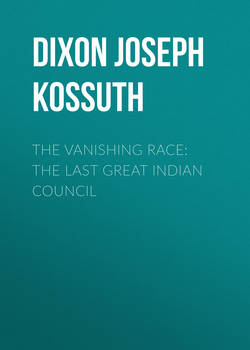Читать книгу The Vanishing Race: The Last Great Indian Council - Dixon Joseph Kossuth - Страница 14
THE STORY OF THE CHIEFS
Chief Apache John
ОглавлениеThe very name Apache means enemy and stands on the pages of all Indian history as a synonym for terror. Since our knowledge of them, the Apaches have been hostile and in every conflict they were favoured with rare and gifted leadership. It required the skill, strategy, and profoundest generalship of two of the greatest generals of the Civil War to subdue and capture the daring and reckless Geronimo, whose recent death closed the final chapter of a long line of unspeakable Apache atrocities. Koon-kah-za-chy, familiarly known as Apache John, because of his surrender to civilization, visited the last Great Indian Council as a representative of one of the many groups of this great body of Indians scattered through the southwest. There is an indefinable air of stoicism in the demeanour of all of these great chieftains. The subject of this text is not lacking in this prominent Indian element. A keen and piercing eye, a sadly kind face, a tall and erect figure, Apache John bears his sixty years of life with broad and unbending shoulders. He was fond of becoming reminiscent and said: “The first thing I can remember is my father telling me about war. We then lived in tepees like the one in which we are now sitting. We were then moving from place to place, and the old people were constantly talking about war. That was the school in which I was brought up – a war school. We kept on moving from place to place until I grew to manhood. Then I came to see a real battle. The first time I was in a battle I thought of what my father had told me. He told me to be a brave man and fight and never run away. I think this was good fighting, because I know what fighting meant from what my father had told me. At that time if an Indian wanted to win distinction he must be a good man as well as a good fighter. I was in a good many battles, until finally I had to give up fighting. About seven years ago the Government gave me advice, and with that advice they gave me different thoughts, and to-day I am one of the head men among the Apaches. I am head chief among the Kiowa-Apaches and I counsel peace among them. I used to think that my greatest honour was to be won in fighting, but when I visited the Commissioner in Washington he gave me other thoughts and other ways of thinking and doing until I felt that the new kind of life was the better. When the Commissioner told me these things I wrote them down in my mind and I thought that it was good. One of the greatest events in my life was when I found myself surrounded by two tribes of my enemies. This fight was by the El Paso River, and the bands of our enemies wore yellow headgear; the fight continued all day long until about five o'clock, when the Apaches were victorious.”
By long and stubborn tutelage both from his father and the members of his tribe, this boy was taught the war spirit and in manhood he exemplified it. The principles of peace taught him in one short hour at Washington changed the whole tenor of his life: a pathetic commentary on what civilization might have accomplished with the Indian.
